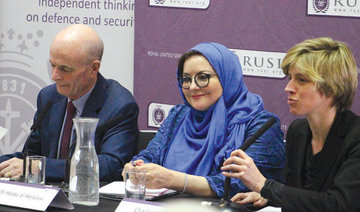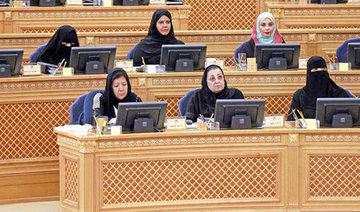RIYADH: Saudi Arabia is opening a new page in its history, Sophie Le Ray, founder of the WIL Series, said as she opened the Women’s Economic Forum in Riyadh on Monday.
Le Ray said that the GCC countries were creating jobs and making it easier and more socially acceptable for women to join the workforce. Saudi Arabia was opening a new page in its history, making remarkable social changes and highlighting its determination to move forward to a more prosperous future, she said.
“The empowerment of women is one of the keys to the modernization objectives set out in the ambitious Vision 2030 and National Transformation Program,” she said.
“Economic performance, innovation, creativity and the economic landscape of the Arab world will be transformed by the skills, talents and labors of women.”
Ten years ago, this inaugural forum was held in Dubai, only attended by women, she said. “Ten years later, we have both genders from all over the world to discuss and champion diversity. It’s a community which is captivating everyone.”
“Empowering women and moving toward a more inclusive society is just smart economics. We are past the point of just conversation, today is about action,” she said.
With 900 people registered to the attend the forum, the attendees were looking forward to hearing from the panel of speakers. A student studying at Dar Al-Hekma University flew in from Jeddah to attend. “I’m very excited to attend and learn,” she said.
She said that she looked forward to finishing her B.A, then masters, and the hopefully would open her own company.
Hadley Gamble, a reporter for CNBC, said: “Men must be our allies; we can work together and change this dynamic and narrative.”
She added: “We can’t understate the importance of what Mohammed bin Salman did.”
Yasser Mufti, vice president, strategy and market analysis at Saudi Aramco, said: “Aramco has made much progress in gender diversity. I went back to marketing, in Aramco Trading, and became a CEO. There was a significant change, one third of the floor were women; we had 170 female employees in Dhahran in various sectors.”
“Seize the opportunity you are given” is the crucial piece of advice that he has given to women and also male counterparts. “With determination you will succeed, and inshallah make Vision 2030 a reality.”
“This can’t be about quotas, it’s about empowering women and hiring women and putting them in management positions. Hire the right people for your team. We have a lot of educated women and it’s going to be tough to choose. We are going to need our male allies to come to the floor and help us with that.”
Women’s Economic Forum opens in Riyadh
Women’s Economic Forum opens in Riyadh

First flights carrying Hajj pilgrims from Turkiye land in Saudi Arabia

- Qualified staff fluent in several languages and equipped with the latest technology will help simplify entry procedures for pilgrims
Madinah: The first flights carrying Hajj pilgrims from Turkiye arrived at Prince Mohammad bin Abdulaziz International Airport in Madinah on Wednesday. The annual Islamic pilgrimage is set to take place this year between June 4 and 9.
Authorities are providing qualified staff who are fluent in several languages and equipped with the latest technology to help simplify entry procedures for pilgrims, the Saudi Press Agency reported, and are ready to assist people arriving by land and sea as well as air.
An estimated 1.8 million pilgrims participated in Hajj last year.
Jeddah communication conference explores anime’s digital evolution

- The session focused on anime’s shift from traditional television broadcasts and DVDs to digital platforms, including live streaming, instant subtitling and cloud-based production
RIYADH: The eighth session of the Digital Communication Conference, titled “Anime in the Digital Space,” explored the transformation of Japanese anime over the past two decades, highlighting the impact of digital innovation and the internet.
According to Saudi Press Agency, the session focused on anime’s shift from traditional television broadcasts and DVDs to digital platforms, including live streaming, instant subtitling and cloud-based production.
Streaming giants such as Netflix, Crunchyroll, and Funimation were highlighted as pivotal players in the transition, offering translated or dubbed episodes immediately upon release and funding original series such as “Devilman Crybaby” and “Cyberpunk: Edgerunners.”
Speakers in the session, including Manga Productions CEO Essam Bukhary, said that social media and online forums have opened the door to unprecedented engagement among fans, as well as community and cultural interaction, since audiences now take part in evaluating episodes.
Concerns were raised that heavy dependence on technology could erode the handcrafted aesthetic that defines traditional anime.
Saudi Arabia’s burgeoning interest in manga and anime, which dates back to the 1970s, is helping to usher in a revolution in cultural production.
Japanese art forms have captivated audiences of all ages, gaining significant popularity in recent years. Their ability to combine entertainment, culture and education has made them of great interest to Saudi society.
To support this interest, the General Entertainment Authority has hosted events like the Saudi Anime Expo, drawing international visitors.
In line with these efforts, the ministries of culture and education launched the Manga Education program to nurture student talent, as well as integrate arts and culture into public education.
Muslim World League chief meets UK Islamic leaders in Madinah

- Delegation visits International Fair and Museum of the Prophet’s Biography
- Visitors reaffirm support for Palestinian cause, call for end to genocide in Gaza
LONDON: The secretary-general of the Muslim World League, Mohammed bin Abdulkarim Al-Issa, met British Islamic leaders in Madinah on Wednesday to discuss issues facing the UK’s Muslim community.
The visitors praised the MWL’s important role in the Islamic world and among Muslim minorities in Europe and the UK, highlighting its work to preserve cultural and religious identities.
They also noted that King Charles welcomed Al-Issa as the first Arab and Muslim figure from outside the UK to visit Buckingham Palace after his coronation.
The delegation visited the MWL-affiliated International Fair and Museum of the Prophet’s Biography, which tells the story of the Prophet Muhammad’s life.
During the talks they reaffirmed their support for the Palestinian cause and called for an “immediate end to the genocide being perpetrated against the people of Gaza by the brutal war machine of the Israeli occupation government.”
Gaza should be a symbol of unity, not division, among Muslim communities, they said, according to an MWL statement.
The delegation commended the 2019 Charter of Makkah, saying it helped foster interaction with non-Muslim audiences and promoted moderation in addressing contemporary issues.
Saudi deputy foreign minister receives Russia’s envoy in Riyadh

Saudi Arabia’s Deputy Minister for Political Affairs Saud Al-Sati received Russian Ambassador Sergey Kozlov in Riyadh on Wednesday.
The pair discussed relations between their countries and other topics of common interest, the Foreign Ministry wrote on X.
Also on Wednesday, Saudi Ambassador to Pakistan Nawaf bin Said Al-Malki met Digital Cooperation Organization Secretary-General Deemah Al-Yahya in Islamabad, the diplomat wrote on X.
They discussed the importance of digital transformation and other topics of interest.
Saudi Arabia welcomes Rwanda, DRC declaration to draft peace deal

RIYADH: Saudi Arabia has welcomed the signing of a declaration of principles between the governments of the Democratic Republic of the Congo and Rwanda.
The Ministry of Foreign Affairs said it appreciated the diplomatic efforts made by the two sides and looked forward to their commitment to the declaration, which would enhance security and stability, the Saudi Press Agency reported.
The foreign ministers of Rwanda and the DRC signed a declaration at the US State Department on Friday. They agreed to draft a peace deal by May 2, respecting each other’s sovereignty and refraining from supporting armed groups after fighting resumed in the DRC’s mineral-rich east in October.






















